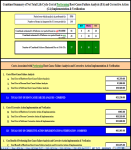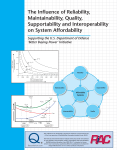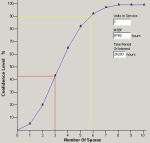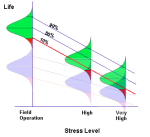| Data & Tools | Publications | Training |
What is it?
Warranties are a formal commitment to deliver (or require delivery of) reliable products/systems. They identify what is warranted, warranty length, what scenarios are/are not covered, and liability. For warranty planning: Include people, process and product costs; Warranted items fail; Performance quality is not guaranteed; Warranties define acceptable liability conditions.
What’s the payoff?
Strategic warranty planning can increase customer confidence, reduce operational costs and provide the opportunity to generate revenue. Effective warranties integrate reliability, maintainability, supportability, availability, and life-cycle costs to arrive at optimized solutions.
How can we help?
- Perform independent benchmarking of your markets to determine the best type of warranty for your products
- Perform reliability analyses of your products and make recommendations to determine a cost-optimized warranty
- Analyze your products to assess whether improvements can be made to justify longer warranty periods
- Collect/analyze warranty data returns to determine reliability trends, root failure causes and potential corrective actions for warranty failures (and beyond)
- Determine how large your spare parts inventory should be to support your warranty program (and beyond)
Related Data & Tools:
 Warranty CalculatorThe Warranty Calculator planning and analysis tool provides automated calculations and comparisons for ten different warranty types in common use. The tool also includes data, information and references that provide further guidance for over 30 additional warranty types.
Warranty CalculatorThe Warranty Calculator planning and analysis tool provides automated calculations and comparisons for ten different warranty types in common use. The tool also includes data, information and references that provide further guidance for over 30 additional warranty types. Total Life Cycle Cost Benefits Calculator for Root Cause Failure Analysis Decision-MakingThe purpose of this Workbook is to estimate the net total life cycle cost (TLCC) impact of performing root cause failure analysis and corrective action (CA) identification, implementation and verification to improve system, product, assembly, component, part or process reliability.
Total Life Cycle Cost Benefits Calculator for Root Cause Failure Analysis Decision-MakingThe purpose of this Workbook is to estimate the net total life cycle cost (TLCC) impact of performing root cause failure analysis and corrective action (CA) identification, implementation and verification to improve system, product, assembly, component, part or process reliability. QuART PROThe QuART software series represents the fourth generation of the highly popular "Reliability Toolkit" series of RMQ engineering aids originated in 1988 by Quanterion personnel while working at the Rome Laboratory (formerly Rome Air Development Center).
QuART PROThe QuART software series represents the fourth generation of the highly popular "Reliability Toolkit" series of RMQ engineering aids originated in 1988 by Quanterion personnel while working at the Rome Laboratory (formerly Rome Air Development Center). QuART ER (Enhancing Reliability)This 2011 release features over 2 dozen new or improved tools over QuART PRO. QuART ER updates more than 10 tools and adds more than 15 new tools to the tool set available in QuART PRO, including the "Ask a Quanterion Expert" function that allows users to direct their reliability questions to an ASQ certified reliability expert at Quanterion.
QuART ER (Enhancing Reliability)This 2011 release features over 2 dozen new or improved tools over QuART PRO. QuART ER updates more than 10 tools and adds more than 15 new tools to the tool set available in QuART PRO, including the "Ask a Quanterion Expert" function that allows users to direct their reliability questions to an ASQ certified reliability expert at Quanterion.
Related Publications:
 The Influence of Reliability, Maintainability, Quality, Supportability and Interoperability on System AffordabilityThe relationship of R&M costs to the Sustainment and Availability Key Performance Parameters (KPPs), the Reliability and Ownership Cost Key System Attributes (KSAs) and the RAM-C Manual processes are discussed. The publication comes with a MS Excel-based tool titled "Optimized Reliability Requirements and Cost Analysis" (OR2CA), developed by Quanterion Solutions Incorporated, that automates the RAM-C process and incorporates three innovative ideas from the Authors presented in the publication.
The Influence of Reliability, Maintainability, Quality, Supportability and Interoperability on System AffordabilityThe relationship of R&M costs to the Sustainment and Availability Key Performance Parameters (KPPs), the Reliability and Ownership Cost Key System Attributes (KSAs) and the RAM-C Manual processes are discussed. The publication comes with a MS Excel-based tool titled "Optimized Reliability Requirements and Cost Analysis" (OR2CA), developed by Quanterion Solutions Incorporated, that automates the RAM-C process and incorporates three innovative ideas from the Authors presented in the publication.
 Warranty Cost: An IntroductionWhether your company is marketing commercial products or selling to the Government, warranties are an important ingredient to competitive success. Effective warranty planning can ensure success, but lack of attention to cost analyses can spell disaster. This article is intended to introduce the basics of warranties and to identify sources for more information.
Warranty Cost: An IntroductionWhether your company is marketing commercial products or selling to the Government, warranties are an important ingredient to competitive success. Effective warranty planning can ensure success, but lack of attention to cost analyses can spell disaster. This article is intended to introduce the basics of warranties and to identify sources for more information. System Spares – What’s the “Right” Answer?Manufacturers are often faced with questions such as:
How often will my system fail?
How many spare parts should I stock?
How confident am I that I will have enough spare parts?
System Spares – What’s the “Right” Answer?Manufacturers are often faced with questions such as:
How often will my system fail?
How many spare parts should I stock?
How confident am I that I will have enough spare parts? Using Accelerated Life Testing to Assess Warranty RiskDuring a recent project, a question arose about the feasibility of providing a ten year warranty for a new system. The system consisted of a proven electronic assembly and 40 newly designed hybrid electronic modules. Warranty costs could be significant if reliability risks were not fully understood. The company producing the system
Using Accelerated Life Testing to Assess Warranty RiskDuring a recent project, a question arose about the feasibility of providing a ten year warranty for a new system. The system consisted of a proven electronic assembly and 40 newly designed hybrid electronic modules. Warranty costs could be significant if reliability risks were not fully understood. The company producing the system
Related Training:
Staff at the RMQSI Knowledge Center have provided many years of value-added consulting and training experience in the RMQ Engineering disciplines, to both commercial and government clients. Browse through our website to learn more and contact us to see how we can develop and present customized training to your organization.

